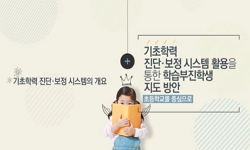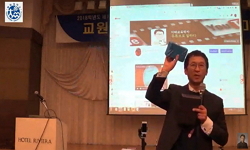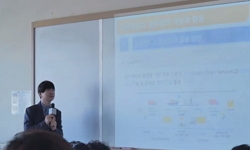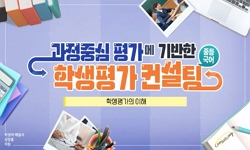이 연구의 목적은 대학의 비교과 프로그램 운영의 특징을 분석하고 학생 인식 설문조사를 통해 학생들의 대학 생활 만족도 제고에 효과적인 비교과 프로그램 운영 방안을 제시하는 데 있다....
http://chineseinput.net/에서 pinyin(병음)방식으로 중국어를 변환할 수 있습니다.
변환된 중국어를 복사하여 사용하시면 됩니다.
- 中文 을 입력하시려면 zhongwen을 입력하시고 space를누르시면됩니다.
- 北京 을 입력하시려면 beijing을 입력하시고 space를 누르시면 됩니다.

학생 중심 비교과 프로그램 운영을 통한 대학 생활 만족도 제고 = Improvment of Students Satisfation through Learner-Centered Extracurricular Programs: Focusing on S University
한글로보기https://www.riss.kr/link?id=A105454559
- 저자
- 발행기관
- 학술지명
- 권호사항
-
발행연도
2018
-
작성언어
-
- 주제어
-
KDC
373
-
등재정보
KCI등재
-
자료형태
학술저널
-
수록면
1-20(20쪽)
- DOI식별코드
- 제공처
-
0
상세조회 -
0
다운로드
부가정보
국문 초록 (Abstract)
이 연구의 목적은 대학의 비교과 프로그램 운영의 특징을 분석하고 학생 인식 설문조사를 통해 학생들의 대학 생활 만족도 제고에 효과적인 비교과 프로그램 운영 방안을 제시하는 데 있다. 이를 위해 본 연구는 S 대학 재학생 293명을 대상으로 비교과
프로그램 운영에 따른 전공 공부, 취업 준비, 대인관계, 학습 동기, 자기계발, 대학 생활, 소속감, 비교과 추천 의향 8개 요인별 만족도 설문조사를 하였다. 데이터 코딩 후 SPSS 22.0 통계패키지를 활용하여 성별, 학년별, 요인별 만족도 차이를 분석하였다. 연구결과, 학교 중심(School-Based) 비교과 프로그램은 학생들의 성별에 따른 전공 공부 요인에서 만족도 차이를 보였으며, 남학생의 만족도 점수가 여학생보다 높게 나타났다. 학년 간에는 취업 준비, 대인관계, 학습 동기, 대학 생활, 소속감, 비교과 추천의향 6개 요인에서 만족도 차이를 보였으며, 대체로 3, 4학년의 만족도 점수가 1, 2학년보다 높게 나타났다. 반면 학생 중심(Learner-Centered) 비교과 프로그램에서 성별에 따른 요인별 만족도 차이는 없었고, 학년 간에는 취업 준비 요인에서만 만족도 차이를 보였으며, 3학년의 만족도 점수가 1학년보다 높게 나타났다. 학교 중심 비교과프로그램과 학생 중심 비교과 프로그램 간의 요인별 만족도를 비교한 결과, 취업 준비를 제외한 7개 요인에서 학교 중심보다 학생 중심 비교과 프로그램에 대한 만족도가 더 높게 나타났다. 특히 학생들은 학생 중심 비교과 프로그램을 통해 대인관계 개선에 대한 도움을 많이 받는 것으로 분석되었다. 따라서 앞으로 대학들이 학생 중심 비교과 프로그램 확대에 역량을 더 집중할 것을 제언한다.
다국어 초록 (Multilingual Abstract)
The purpose of this study is to analyze the characteristics of university extracurricular programs and to propose effective management methods for students satisfaction with extracurricular programs through university students perceptions. For that ...
The purpose of this study is to analyze the characteristics of university extracurricular programs and to propose effective management methods for students satisfaction with extracurricular programs through university students perceptions. For that purpose, this study conducted a survey of students satisfaction with the
management of extracurricular programs at S university, and 293 students participated.
Questionnaires consisted of eight factors: major study, job preparation, interpersonal relationship, motivation, self-development, college life, sense of belonging and extracurricular recommendation. As a results, statistically significant differences were observed in the participants gender and grade levels on satisfaction with school-based
extracurricular programs. In relation to the gender level, male students scored higher than female students on satisfaction of major study factor. With regard to the grade level, junior and senior students scored higher than freshman and sophomore students on satisfaction of job preparation, interpersonal relationship, motivation, college life, sense of belonging and extracurricular recommendation factors. On the other hand, a statistically significant difference was not observed in the participants gender level on stisfaction with learner-centered extracurricular programs but there was a statistically significant difference in the grade level. Junior scored higher than freshman on
satisfaction of job preparation factor. Students satisfaction on learner-centered extracurricular programs showed higher than their satisfaction on school-based ones in major study, interpersonal relationship, motivation, self-development, college life, sense of belonging and extracurricular recommendation factors. Especially, it was found that students are more helped to improve interpersonal relations through learner-centered extracurricular programs. Therefore, the universities should expand the management of learner-centered extracurricular programs and minimize school-based extracurricular programs.
목차 (Table of Contents)
- Ⅰ. 서 론
- Ⅱ. 문헌 연구
- Ⅲ. 연구 방법
- Ⅳ. 연구 결과
- Ⅴ. 논의 및 결론
- Ⅰ. 서 론
- Ⅱ. 문헌 연구
- Ⅲ. 연구 방법
- Ⅳ. 연구 결과
- Ⅴ. 논의 및 결론
동일학술지(권/호) 다른 논문
-
프로젝트 접근법과 레지오 에밀리아 접근법 관련 유아교육 연구의 동향 비교
- 학습자중심교과교육학회
- 장상옥(Jang, Sang Ock)
- 2018
- KCI등재
-
중ㆍ장년 실직자의 정서적 안정감과 구직강도의 관계에서 회복탄력성의 매개효과
- 학습자중심교과교육학회
- 장용희(Chang Yong Hee)
- 2018
- KCI등재
-
재한 중국인 대학생의 지각된 차별감이 학업성취에 미치는 영향
- 학습자중심교과교육학회
- 제빙석(Qi, Bings)
- 2018
- KCI등재
-
- 학습자중심교과교육학회
- 최춘호(Choi, Chun Ho)
- 2018
- KCI등재





 스콜라
스콜라






